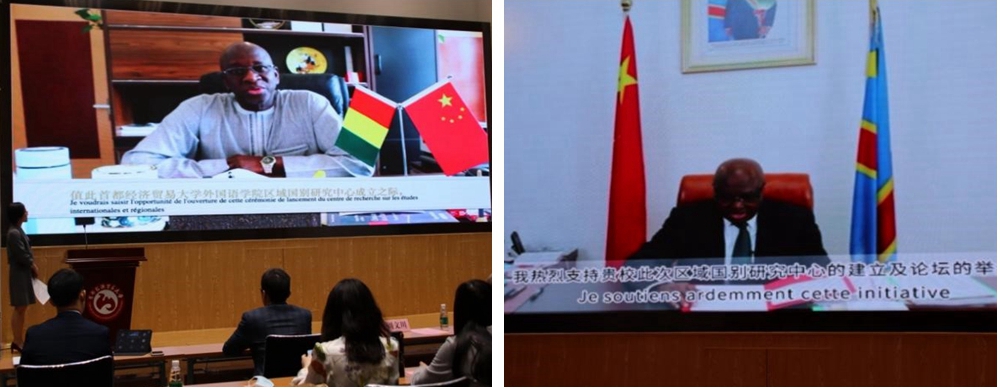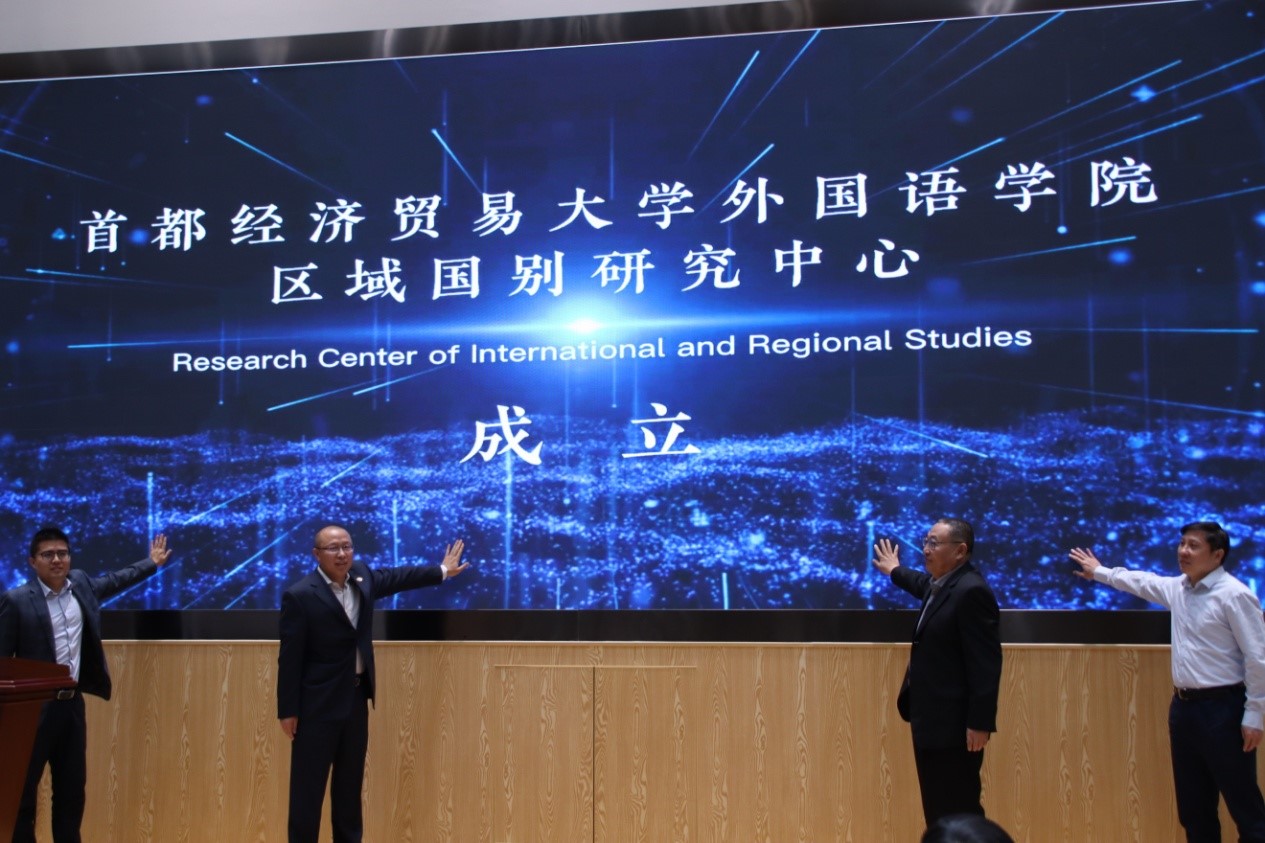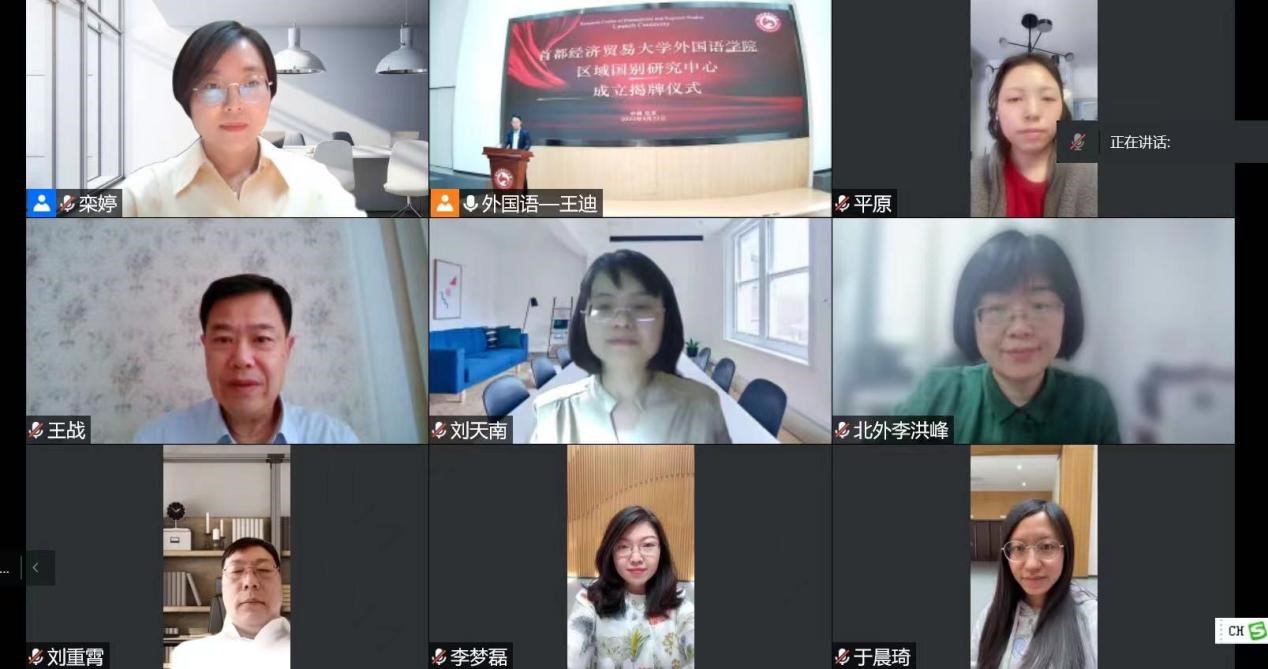CUEB School of Foreign Studies Inaugurated Research Center of International and Regional Studies
On the morning of April 22, the inauguration ceremony and keynote forum of the Research Center of International and Regional Studies of the School of Foreign Studies was held in the Press Room of Boyuan Building.
The ceremony was marked by video congratulations from S.E Dr Saramady TOURE, Ambassador of the Republic of Guinea in China, and S.E.M François Nkuma BALUMUENE, Ambassador of the Democratic Republic of the Congo in China.

Video congratulations from Ambassador Saramady TOURE and Ambassador BALUMUENE
Yao Dongxu, Director of the Office of Research, Liu Chongxiao, Dean of the School of Foreign Studies, and Hou Qibin, Director of the Research Center of International and Regional Studies, made congratulatory remarks on the establishment of the Center.

Remarks by Yao Dongxu, Liu Chongxiao and Hou Qibin
Yao Dongxu, Liu Wenchuan, Secretary of the Party Committee of School of Foreign Studies, Huang Liwei, Vice Dean of School of International Education, and Zhao Jiazhang, Vice Dean of School of Economics jointly inaugurated the Research Center of International and Regional Studies.

From Left: Zhao Jiazhang, Liu Wenchuan, Yao Dongxu, Huang Liwei.
Hou Qibin presided over the keynote forum, and four domestic experts on international and regional studies gave keynote lectures to the students and faculty.
Professor Li Anshan from Peking University lectured on The Purpose and Methodology of International and Regional Studies in China. He first introduced different research methods and schools in the field of international and regional studies at home and abroad, then elaborated on its history, current situation, different stages of development, as well as the characteristics and positions of international and regional studies in China. Finally, he introduced several key international and regional research institutions, including Tsinghua University, Peking University and Institute of West-Asian and African Studies (IWAAS) Chinese Academy of Social Sciences (CASS), and their respective research characteristics. In the future, Li Anshan expected the research center to deepen its exchanges and cooperation with others and make its own contribution to international and regional studies in China.
Professor Wang Zhan from Wuhan University delivered a speech of Thinking on International and Regional Studies, analyzing the values, difficulties and challenges of these studies in China from five aspects, including why, what, what to do, how to do and how to evaluate. In addition, his speech indicated that this field contributes to our international strategy with Chinese characteristics in the new era. Besides, Professor Wang expounded the ways and modes of international and regional studies through an introduction to the focus and achievements of his research team.
Li Hongfeng, Dean of School of African Studies, Beijing Foreign Studies University, gave a speech of the Ways of Foreign Language Teachers to Make International and Regional Studies. Professor Li, who has been making studies on France, took the research of French countries and regions as examples to demonstrate the current situation and trend of International and Regional Studies in China with detailed data, and pointed out achievements domestic scholars have scored and problems we face in recent years.
Liu Tiannan, associate professor in charge of the Institute of African Studies, University of International Relations (UIR), delivered a speech of French Language Teaching and African Studies. She gave a detailed introduction to the work and achievements in African Studies of UIR in these years, and shared precious experience and thoughts on cooperation between UIR and well-known scholars, institutions and partner universities at home and abroad. Besides, citing an example of African Studies, she exchanged the ways of foreign language teachers to make national and regional studies.

Four experts give video lectures to teachers and students.
International and Regional Studies is a comprehensive and in-depth study on the humanities, geography, politics, economy, society and military affairs of specific countries or regions. It directly facilitates China’s reform and opening -up and socialist modernization with Chinese characteristics, especially the Belt and Road Initiative and the overall opening-up and development of global governance. International and Regional Studies was first incorporated among the first-class disciplines of Foreign Language and Literature since the Introduction to First-level Disciplines of Degree Awarding and Talent Cultivation was issued by the Office of the State Council Academic Degrees Committee of the State Council in 2013. In 2018, disciplines of Foreign Language and Literature have covered International and Regional Studies since the Steering Committee for Higher Education of the Ministry of Education unveiled the National Standard on the Teaching Quality of Undergraduate Majors in Colleges and Universities. The Office of the State Council Academic Degrees Committee issued the Catalogue of Disciplines for Doctor’s and Master’s Degree Awarding and Talent Cultivation (Draft for Comments), which added the category of “inter-disciplines”, consisting of six first-level disciplines, including International and Regional Studies. On this basis, the School of Foreign Studies has decided to set up the Research Center of International and Regional Studies, leveraging CUEB special education resources and our foreign language teachers, advancing cooperation with School of International Education and the School of Economics and others and allocating resources inside and outside the university, home and abroad. As such, we will build our research center into a high-level academic research institution with distinctive characteristics, as well as into an international research cooperation and exchange base.
The establishment of Research Center of International and Regional Studies is one of important measures of the School of Foreign Studies CUEB in research, and it will also help CUEB to seek development opportunities and open up new horizons in interdisciplinary and cross-field research.
In addition to some faculty representatives from the School of Foreign Studies, scholars, experts, teachers and students from CUEB and other universities or institutions also participated in the ceremony online. The ceremony was presided over by Luan Ting, dean assistant of the School of Foreign Studies.
Going forward, Student Affairs Department of the Party Committee will create more excellent cases about ideological and political education through great efforts to strengthen learning, build platforms for communication, and to innovate counselors’ work and practice.
